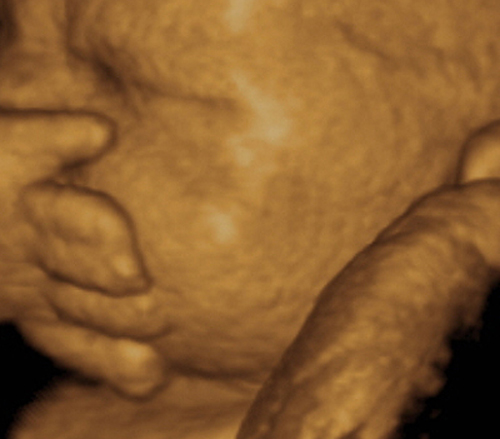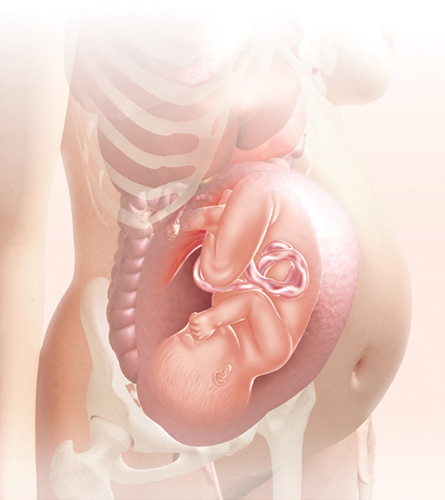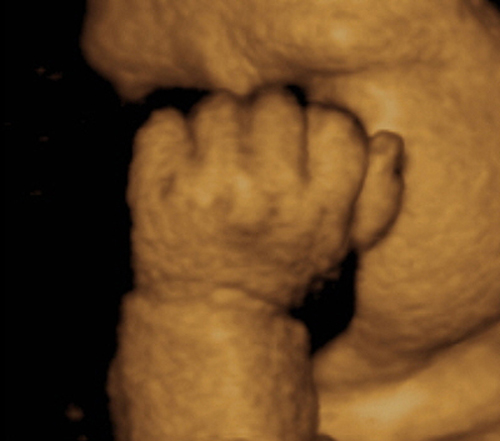You are 38 Weeks Exactly 14 days to go…
If you haven’t found out the sex of your baby, the excitement will be building; if you have, you can get very organized!
Your baby today
The back of the hand is held up against the mouth in this image.
Your baby will be practicing suckling at every opportunity, but this
will be with parts of the hands, thumbs or fingers, since it’s no longer
easy to reach the toes.

Knowing the sex of your baby
enables you to decide on the name, buy specific outfits, and even
decorate the nursery, if you have one, in a certain way. Remember,
however, there’s a chance that the scan
gave you misleading information. The only way to be absolutely certain
of the baby’s gender is if you found out following a diagnostic test,
such as amniocentesis or chorionic villus sampling .
If you know the sex, you
won’t have the same incentive of a surprise at the end of your labor,
but you may feel you can bond more closely with your baby during
pregnancy and picture what he or she will be like as a newborn.
If you don’t know the sex
yet, then you will have a well-earned surprise after your hard work in
labor. Some women who don’t know the sex of their babies say that they
have a strong instinct that the baby is a particular sex, but may be
quite surprised when they have a baby of the opposite sex.
Try to keep an open
mind and not raise your hopes about having a baby of a certain
gender—the odds are slightly in favor of you having a boy.
While knowing the sex of your baby helps you make decisions, such as should you buy pink or blue, not knowing gives you a greater sense of anticipation.

Boys and girls
Still wondering what you’re having? Well, to help you guess, you might want to bear in mind a few more old wives’ tales…
If you have soft hands you’re having a girl, rough hands you’re having a boy.
If the father-to-be is nervous, it’s a girl, if he’s relaxed it’s a boy.
If the mother picks up her coffee cup with two hands it’s a girl, if she picks it up by the handle it’s a boy.
If you have a sensitive belly button it’s a girl, if you have cold feet it’s almost certainly a boy!
… Doctor
| Q: |
My baby is in a posterior position. How will this affect my labor?
|
| A: |
In the posterior position the baby faces your belly instead of your spine (see Lie and presentation).
This position may prolong your labor, which can be tiring, and cause
more of a backache. If this is the case, you can try the same methods as
for turning a breech baby (see Repositioning your baby) to encourage your baby to move into an anterior position.
Sometimes the baby
turns with the help of contractions when you are in fully established
labor. If she doesn’t turn, intervention such as the use of forceps or
vacuum may be needed.
|
Your body is designed to handle the pain of labor!
Nobody likes
pain, but your body’s endorphin levels will increase during labor to
help you cope with it. So it’s reassuring to know that as the intensity
of the contractions build, so does your ability to handle them.
Your 39th Week
Know the signs that
mean labor is really about to start. You may have some false alarms, so
don’t hesitate to call your doctor for advice and reassurance.
Excitement will be competing with nerves—and that goes for your partner
as well. No one can predict how labor is going to turn out, but before
the big day it’s helpful to agree on what your partner’s role should
ideally be.
NOTE
Time may feel as though it’s standing still and every small twinge has you on the alert

You are 38 Weeks and 1 Day 13 days to go…
With labor imminent, you’ll be playing the waiting game. Staying active will help the time pass much more quickly.
Your baby today
This baby’s hand is in the same position as in the image
opposite, with the fist held tightly in front of the face. All of your
baby’s movements help build muscle strength and aid coordination,
whether it’s a kick or simply curling and uncurling the fingers.

You’ll be resting a lot in the next two weeks.
As your figure expands and you become more tired, it’s natural to want
to sit out the remainder of your pregnancy at home with your feet up,
and put the answering machine on to field all the “Has it arrived?”
inquiries!
It’s fine to do this but
it’s good to remember that the very best way to stimulate labor is to
keep active. What’s more, the hormones produced by even gentle walking
will lift your mood and help you feel more positive when your labor
begins.
Try giving yourself
one or two small tasks each day—perhaps meeting a friend for lunch,
going for a very gentle swim, or purchasing some last-minute items for
baby—being careful to stop and put your feet up when you feel tired. Be
sensible about the type of activities you undertake, and avoid anything
that could be exhausting or potentially dangerous; for example, bear in
mind that your center of gravity is way off balance at the moment, and
that wallpapering the nursery or carrying heavy groceries should
definitely not be on your to-do list.
It may feel as though
your life is on hold at the moment so that’s why it’s good to fill your
time as best you can. Don’t forget, however, that in just a couple of
weeks you’ll have your newborn occupying all your time.
The power of music
Research has shown that women who listen to music during labor
tend to feel less stressed and are less likely to need pain relief.
There’s also some evidence to suggest that babies born to the
accompaniment of music are calmer.
One study compared
different beats and found that classical, instrumental sounds were the
most relaxing. Familiar tunes and rhythms could distract you from the
pain and—if you choose the right track—help you focus on your breathing.
Line up a selection of tunes on your iPod well in advance of labor.
Try out a selection of music
to discover what you find most soothing, or invigorating. Labor is a
bit like a mini-marathon and listening to the right tunes might just
help you get to the finish line.
